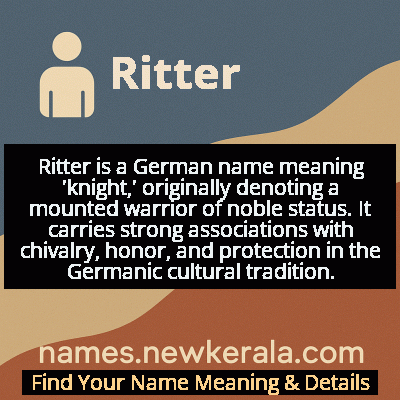Ritter Name Meaning & Details
Origin, Popularity, Numerology Analysis & Name Meaning of Ritter
Discover the origin, meaning, and cultural significance of the name RITTER. Delve into its historical roots and explore the lasting impact it has had on communities and traditions.
Name
Ritter
Gender
Male
Origin
German
Lucky Number
9
Meaning of the Name - Ritter
Ritter is a German name meaning 'knight,' originally denoting a mounted warrior of noble status. It carries strong associations with chivalry, honor, and protection in the Germanic cultural tradition.
Ritter - Complete Numerology Analysis
Your Numerology Number
Based on Pythagorean Numerology System
Ruling Planet
Mars
Positive Nature
Generous, passionate, energetic, and humanitarian.
Negative Traits
Impulsive, impatient, moody, and can be overly emotional.
Lucky Colours
Red, maroon, scarlet.
Lucky Days
Tuesday.
Lucky Stones
Red coral, garnet.
Harmony Numbers
1, 2, 3, 6.
Best Suited Professions
Military, sports, philanthropy, leadership roles.
What People Like About You
Courage, energy, leadership, generosity.
Famous People Named Ritter
Johann Wilhelm Ritter
Physicist and Chemist
Discovered ultraviolet light and made significant contributions to electrochemistry
Karl Ritter
Geographer
One of the founders of modern scientific geography and comparative geography
John Ritter
Actor
Emmy Award-winning actor known for his role in 'Three's Company'
Alfred Ritter
Chocolate Manufacturer
Co-founded Ritter Sport chocolate company, creating one of Germany's most iconic food brands
Name Variations & International Equivalents
Click on blue names to explore their detailed meanings. Gray names with will be available soon.
Cultural & Historical Significance
In German-speaking cultures, the name evolved from an occupational title to a hereditary surname, carried by families who could trace their lineage to knightly ancestors. The cultural resonance of Ritter extends beyond Germany, influencing naming traditions across Central and Eastern Europe. The name symbolizes not just military strength but also the ideals of courtly behavior, protection of the weak, and adherence to a moral code—values that continue to resonate in modern interpretations of knighthood. This cultural legacy makes Ritter more than just a name; it represents a connection to a rich historical tradition that balances martial capability with ethical conduct.
Extended Personality Analysis
Individuals named Ritter are typically perceived as possessing strong, principled characters with natural leadership qualities and a protective instinct toward others. They often exhibit the chivalric virtues of courage, loyalty, and honor that their name suggests, approaching challenges with determination and strategic thinking. These individuals tend to be reliable and steadfast in their commitments, valuing their word and maintaining strong moral boundaries in both personal and professional relationships.
Their personality often combines traditional values with practical problem-solving abilities, making them effective in positions of responsibility. While they can be serious when circumstances demand, they also possess the courtesy and diplomatic skills associated with their knightly namesake. Ritter-named individuals typically demonstrate resilience in adversity and a willingness to defend their principles, yet they balance this strength with the wisdom to know when diplomacy serves better than confrontation. This combination of fortitude and discernment makes them respected figures in their communities and reliable anchors in times of crisis.
Modern Usage & Popularity
In contemporary naming practices, Ritter maintains a distinctive presence as both a surname and given name, though it remains more commonly used as a family name. As a first name, it has experienced moderate but steady usage, particularly in German-speaking regions and among families of German descent worldwide. The name appeals to parents seeking a strong, traditional name with clear European heritage that isn't overly common. Recent trends show a slight increase in its usage, possibly influenced by the broader revival of vintage and occupational names. Ritter's commercial visibility through brands like Ritter Sport chocolate has kept the name familiar without making it trendy or overexposed. It occupies a unique niche—recognizable enough to be easily pronounced and remembered, yet distinctive enough to stand out from more conventional choices.
Symbolic & Spiritual Meanings
Symbolically, Ritter represents the enduring human ideals of protection, honor, and moral courage. The name evokes the archetype of the knight—not merely as a historical warrior, but as a metaphor for ethical strength and principled action in modern life. It symbolizes the capacity to face challenges with bravery while maintaining compassion and justice. Beyond its martial associations, Ritter carries deeper meanings of service to others, commitment to higher principles, and the balance between strength and nobility of character. The name suggests someone who serves as a 'moral compass' for their community, embodying the timeless values of chivalry adapted to contemporary contexts. It represents the bridge between historical tradition and modern virtue, reminding us that the ideals of knighthood—courage, loyalty, and protection—remain relevant in today's world.

